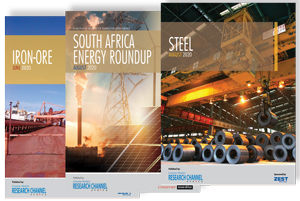For one year, access to the electronic edition of Engineering News & Mining Weekly.
- Home
- Latest News
- Sector News
- Back
- Agriculture
- Automotive
- Chemicals
- Construction
- Defence & Aerospace
- Economy
- Electricity
- Energy
- Environmental
- Manufacturing
- Back
- Manufacturing Home
- Capital Equipment
- Chemicals & Pharmaceuticals
- Clothing & Textiles
- Food & Beverage
- Foundries, Forges & Die-Casting
- Furniture & Wood products
- Hydraulics
- Industrial Filters & Filtration
- Instrumentation & Control
- Manufacturing
- Metals & Engineering
- Paper, Plastics, Packaging, Printing
- Pipes & Tubes
- Pumps
- Rubber
- Valves
- Welding & Cutting
- Metals
- Mining
- Renewable Energy
- Services
- Technology & Communications
- Trade
- Transport & Logistics
- Water
- Magazine
- Back
- This Week
- Back Copies
- Cartoon
- Business Leader
- Editorial Insight
- Company Profiles
- Photo of the Week
- Features Library
- Back
- Features Library Home
- Aerospace
- Africa Energy Indaba
- African Utility Week
- Agricultural Engineering
- Air, Gas, Fumes and Dust Control
- Airports & Airport Cities
- Aluminium
- Automation and Computerisation
- Automotive Components
- Automotive Industry
- bauma CONEXPO AFRICA
- Bearings and Bushes
- Biofuels
- Boilers and Burners
- Branded Profiles
- Brewery and Winery
- Business Conferences and Exhibitions
- Business in Africa
- Business in KwaZulu-Natal
- Business in the Western Cape
- Cables and Accessories
- Capital Equipment in Construction
- Cement and Concrete
- Chemicals and Petrochemicals
- Civil Engineering and Construction
- Climate Change
- Commercial and Industrial Property
- Compressors, Air Motors and Vacuum Pumps
- Construction
- Construction Materials and Equipment
- Consulting Engineers
- Corporate Profiles
- Corrosion Control, Coatings and Tribology
- Courier and Freight Services
- Defence
- Drones
- Education and Training
- Electrical Power Generation and Transmission
- Electrification and Distribution
- Energy Efficiency and Management
- Engineering Education
- Environmental Protection
- Eskom
- Factory Automation
- Fasteners
- Fire Prevention and Protection
- Fleet Management (TruckX Conference)
- Flooring, Screening and Handrailing
- Food and Beverages
- Foundries, Forges and Die-Casting
- Furnaces, Kilns, Ovens and Dryers
- Gas
- Gas-to-Power
- Generators and Standby Power
- Glass Manufacturing
- Green Building and Industries
- Green Industries
- Hand-Held and Power Tools
- Harbour and Offshore Services
- Harbour Infrastructure and Dredging
- Health and Safety
- Heating and Cooling
- Heavy Lifting and Abnormal Loads
- Hydraulics and Pneumatics
- Industrial and Commercial Lighting
- Industrial Cleaning and Shutdown
- Industrial Filters and Filtration
- Industrial Financing
- Infrastructure & Services
- Instrumentation and Control
- Italy-South Africa Partnership
- Labour Relations
- Laser Technology
- Lifts, Escalators and Passenger Conveyors
- Locomotives, Railway Trucks and Wagons
- Machine Tools
- Maintenance and Refurbishment
- Manufacturing
- Materials-Handling and Logistics
- Medical and Pharmaceutical Engineering
- Motors, Drives and Mechanical Power Transmission
- Nampo
- Noise, Vibration and NDT
- Nuclear Energy
- Oil Refineries
- Oils and Lubricants
- Packaging, Labelling and Barcoding
- Paper, Pulp and Board
- Pipes, Tubes and Hoses
- Plastics and Synfibres
- Power & Electricity World Africa
- Power-Gen Africa
- Project Management
- Public Transport and Infrastructure
- Pumps
- Rail Transport and Infrastructure
- Roads
- Rubber Manufacturing & Products
- Southern African Institute of Welding
- SAISC
- Sasol ? Chemicals & Retail Fuel
- Sassda
- Seals, Gaskets and Sealing Mechanisms
- Security Technology for Business
- Sewage and Effluent
- Small Business and Supplier Development
- Solar Energy
- South Africa Germany Partnership
- South Africa-China Partnership
- SEZ, IDZ & Agri Parks
- Stainless Steel
- Steel
- Steel Construction and Cladding
- Sugar Growers, Millers and Refiners
- Temperature, Pressure and Process Control
- Testing, Inspection & Certification Services
- Top Projects
- Truck, Trailer, Bus and Bakkie
- Valves
- Vessels, Heat Exchangers, Tanks and Containers
- Warehousing and Storage
- Waste Management and Recycling
- Water Engineering and Infrastructure
- Water Treatment, Purification and Desalination
- Water Week
- Welding and Cutting
- Wind Energy
- Wire, Rope, Sling and Chain
- Work Apparel
- Working at Height
- Supplements
- Video Reports
- Research
- Press Office
- Back
- All Companies
- AECOM
- AfriSam
- Arup
- AT Kearney
- Atlas Copco
- Barloworld Logistics
- Bearings International
- Cova Advisory & Associates
- DEHN Africa
- Ecic
- ELB
- Engen
- Fasken
- Goscor Group
- Hatch
- Hilti
- Hogan Lovells
- Huawei
- IFAT Africa
- ISG
- Jungheinrich
- Juwi
- NCPC (National Cleaner Production Centre)
- PCMP
- Powermite
- Pyrotec Packmark
- Resolve Solution Partners
- SACEEC
- Seifsa
- Siyenza
- SKF Group
- Skyriders
- SMS group
- SRK Consulting
- SSG Consulting
- Syspro
- thyssenkrupp
- Transnet Port Terminals
- Universal Storage
- Weir Minerals Africa
- Westcon-Comstor
- WSP
- Announcements
- Login
- Columnists
- What's On
- fdt AFRICA
- Jobs
- Topics
- Tenders
- Apps
- Supplier's Directory
- About Us
- Legal Notice
- Comment Guidelines
- Letters
- Marketing Videos
Note: Search is limited to the most recent 250 articles. To access earlier articles, click Advanced Search and set an earlier date range.
To search for a term containing the '&' symbol, click Advanced Search and use the 'search headings' and/or 'in first paragraph' options.
Sponsored by
Nuclear Is Safest, Cleanest, Cheapest
We're sorry, this content is only available to subscribers.
Already a subscriber? Please login here
Subscribe Now to get all these benefits.

Loading...
per month, billed annually
Monthly debit order and ZAR rates available.
To find out more click here
- All Engineering News & Mining Weekly content
- Access to all search results
- Access to the Projects Browser
- Digital magazine back copies
- PDF Research Report of your choice
+
- Weekly magazines delivered to your door
Access to all news content on Engineering News Online and mobi websites


Access all search results from a database of published material dating back to 1999
Access to the websites Projects Browser and Tenders sections


Access to the full digital library of back copies from the weekly editions of Engineering News and Mining Weekly
PDF Research Report of your choice

Weekly editions of Engineering News & Mining Weekly
- posted to you each week

Access to all archived Engineering News Online content
Loading...
per month, billed annually
Monthly debit order and ZAR rates available.
To find out more click here
- All Engineering News & Mining Weekly content
- Access to all search results
- Access to the Projects Browser
- Digital magazine back copies
- PDF Research Report of your choice
+
- Weekly magazines delivered to your door
The weekly editions of Engineering News and Mining Weekly will be posted to your preferred postal address. Gain online access to:
- Project Browser - providing an overview of latest developments and useful contract and contact information. Projects can be sorted by industry or mining sector, location or value.
- The Creamer Media database of published material dating back to 1999
- Advanced search function enabling the execution of structured database searches
- Daily News Alerts on a number of industrial and mining sectors
- Full access to the mobi sites
- Weekly print editions of Engineering News and Mining Weekly
NOTE:
You may complete your transaction now by clicking 'add to cart' and 'check out' or email subscriptions@creamermedia.co.za for assistance.
For one year, the weekly editions of Engineering News & Mining Weekly, delivered to your preferred address, as well as your choice of PDF Research Report published by Creamer Media’s Research Channel Africa. You can select from:
- Electricity 2020 (published April 2020)
- Construction 2020 (published March 2020)
- African Mining Projects in Progress 2020 (published March 2020)
- Defence 2020 (Published February 2020)
- Canadian Mining Projects in Progress 2020 (Published December 2019)
- Water 2019 (published December 2019)
- Telecommunications 2019 (published December 2019)
- Gold 2019 (published October 2019)
- Platinum 2019 (published September 2019)
For one year, the weekly editions of Engineering News & Mining Weekly, delivered to your preferred address, as well as online access to:
- E-Magazine archive of all published editions of Engineering News & Mining Weekly
- Projects Browser – updating you on the latest developments at global industrial and mining projects;
- The ability to save articles for future reference
- The ability to search through the article database – dating back to 1999
- Your choice of PDF Research Report published by Creamer Media’s Research Channel Africa.
You can select from:
- Electricity 2020 (published April 2020)
- Construction 2020 (published March 2020)
- African Mining Projects in Progress 2020 (published March 2020)
- Defence 2020 (Published February 2020)
- Canadian Mining Projects in Progress 2020 (Published December 2019)
- Water 2019 (published December 2019)
- Telecommunications 2019 (published December 2019)
- Gold 2019 (published October 2019)
- Platinum 2019 (published September 2019)
Get access to intelligence on industry and mining. The service offers access to:
- A database of published material dating back to 1999
- Detailed research reports on a diverse range of industry and mining sectors - including monthly reports on African, Australasian, Canadian, Coal and Iron-Ore Mining
- A project-tracking service
- African country profiles
- Profiles of over 450 South African and international mining operations
- Daily News Alerts on a number of industrial and mining sectors
Per user discounts are available for multiple users, please email subscriptions@creamermedia.co.za to find out more.
Note that all subscribers will be registered for the Free Daily Email Newsletter
About
Engineering News is a product of Creamer Media.
www.creamermedia.co.za
Other Creamer Media Products include:
Mining WeeklyResearch Channel Africa
Polity
About
Newsletters
Sign up for our FREE daily email newsletter
Receive daily sector news alerts
For subscribers only - please log-in
Newsletters
Subscriptions
We offer a variety of subscriptions to our Magazine, Website, PDF Reports and our photo library.
Subscriptions are available via the Creamer Media Store.
View storeSubscriptions
Advertise
Advertising on Engineering News is an effective way to build and consolidate a company's profile among clients and prospective clients. Email advertising@creamermedia.co.za
View options







